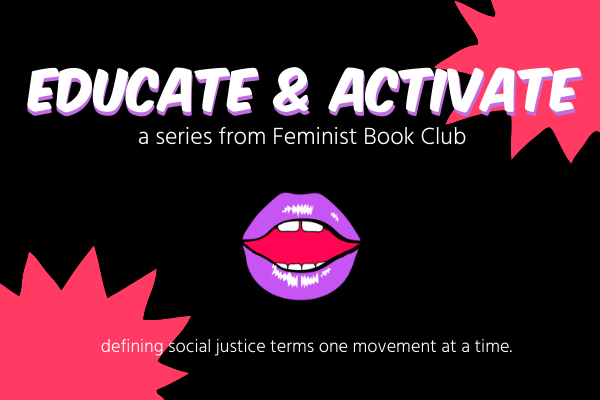Feminist Book Club blog contributors are working together to create posts as an “Educate & Activate” series. We will define a term or movement, provide historical context, and give you additional resources to learn more. We believe that an educated populace can be better activists, accomplices and co-conspirators. It is important to note that these are meant to be brief descriptions and not inclusive or exhaustive of all resources. We urge you to continue being curious, and continue learning more.
Definition
In this Educate & Activate post, sex will be used to describe the label assigned to babies at birth depending on their reproductive organs. Gender identity will be used to describe how a person identifies. Gender is a social construct and lies on a spectrum, so it is possible to identify on the binary spectrum of gender, or to also identify outside of the binary gender labels entirely.
The term cisgender is used to describe someone who identifies with the sex that they were assigned at birth. For a great deal of people, the sex of female or male that they were assigned at birth is what they continue to identify their gender as. For example, when I was born, I was assigned the sex of female and I still identify with the gender of being a girl so I am cisgender. This is not always the case and there are many people who were assigned a sex at birth that does not follow their gender identity and some of these people identify as transgender, gender non-binary, or without labels. Cisgender specifically refers to one’s gender identity and not one’s sexuality (who they are sexually attracted to).
Usage
The word cisgender has been around for a long time with its roots in latin because the prefix “cis” means “on the same side as” and “gender” referring to how a person identifies. As a result, when someone is cisgender, they identify “on the same side as” the sex they were assigned at birth. The term cisgender has gained more attention in recent years following the usage of the term by transgender activists to describe those who do not identify as transgender.
Nowadays, cisgender is often shortened to cis in more colloquial conversations and circumstances. For example, when introducing myself to someone who I feel comfortable with, I may say “I am a cis queer woman” to describe how I identify with the sex I was assigned at birth but my sexuality falls on the queer spectrum. Additionally, it is common to hear people describe others as cis. For example I might say, “the majority of members of the United States Congress are cis white men. They should not represent and make decisions for the diverse public” when conversing with others.
Cisgender Privilege
It is important to recognize that if you identify as cisgender, you do have privilege because of your ability to live without worrying about your basic human rights and your access healthcare. People who are cisgender do not have to fear their rights will be impeded based on their gender identity and how they present, nor if they will be treated fairly when receiving healthcare. Additionally, people who are cisgender often do not have to worry about being misgendered (having someone refer to them by their incorrect gender identity) which can be very traumatic.
Ways to Be Respectful of Gender Identity
1. Never assume anyone’s identity.
2. Because you are not assuming someone’s identity, ask if they are comfortable sharing their pronouns.
3. Share your pronouns to help normalize the sharing and usage of pronouns.
4. Try to avoid using gendered language such as “you guys” or “ladies and gentleman.”
5. Recognize the privilege you hold if you identify as cisgender, and use this privilege to lift up the voices of those who identify as transgender or with another identity. Use your privilege to fight for justice and equality.
Working to be inclusive of all identities does not happen overnight. It takes continued reflection and conscious work, so understand that you will make mistakes but that your work towards justice and equality is nothing compared to those who have been fighting to be their truest selves their entire life.
Resources for Further Education
- What Does it Mean to Be Cisgender?
- Picture Book- It Feels Good to Be Yourself by Theresa Thorn
- 30 Examples of Cisgender Privilege
- Orlando by Virginia Woolf (Fiction)
- The Left Hand of Darkness by Octavia Butler
- Gender Trouble: Feminism and the Subversion of Identity by Judith Butler
- Redefining Realness by Janet Mock


